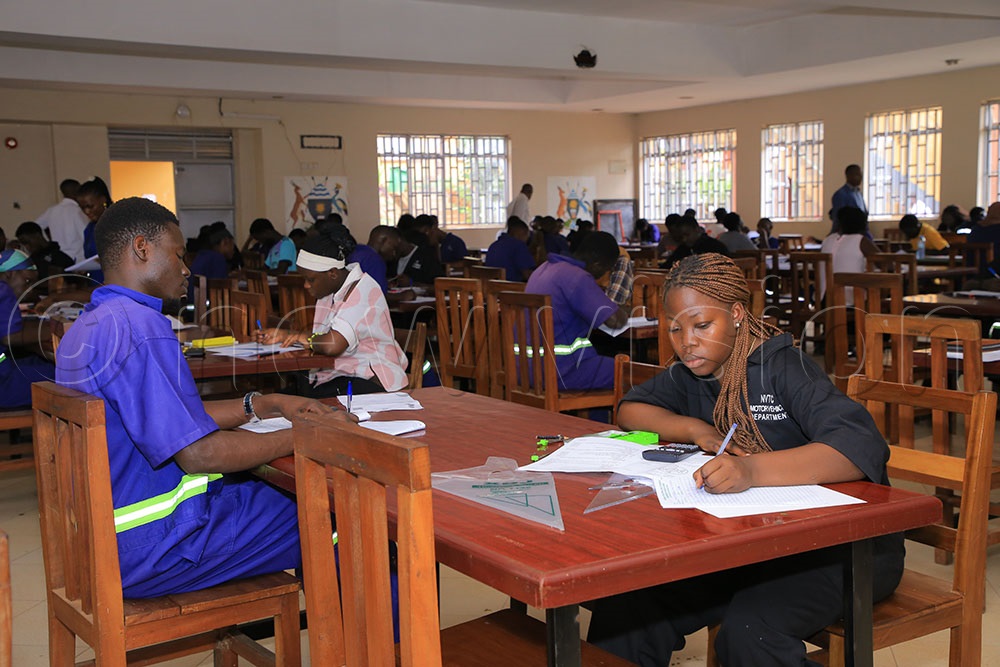No hiccups as over 55,000 commence national TVET exams across Uganda
A spot check by New Vision showed a generally trouble-free exercise as a total of 55,966 candidates put their skills to the test in the July–August 2025 TVET assessments.
Students at Nakawa Vocational Training College writing their Steel Bending and Fitting Theory Exam on 11th August. (Photo by Miriam Najjingo)
__________________
Uganda’s national Technical Vocational Education and Training (TVET) exams commenced smoothly on Monday, with centres nationwide reporting steady progress.
A spot check by New Vision showed a generally trouble-free exercise as a total of 55,966 candidates put their skills to the test in the July–August 2025 TVET assessments.
At Nakawa Vocational College, a government-owned institution, Patrick Asiimwe Sunday, the dean of students, said 424 students are sitting for the exams.
“Today we have commenced with theory papers, including engine maintenance, electrical engineering science, domestic water supply, and light-duty welding,” he said.
At YMCA Comprehensive Institute in Wandegeya, a privately-owned institution, officials also reported no incidents. “We have done engine systems and management, while our plumbing candidates did domestic water supply, and all went well,” said Emmanuel Matsiko, the in-charge of external examinations.
Students at Nakawa Vocational Training College writing their Automotive Fitting and Fabrication Theory and Steel Bending and Fitting Theory Exams on 11th August. (Photo by Miriam Najjingo)
According to Narasi Kambaho Anyijuka, spokesperson for the Uganda Vocational and Technical Assessment Board (UVTAB), all practical examiners and scouts had reported to their stations by Sunday, August 10.
“Today we have started the theory examinations, but practical examinations will start tomorrow across the whole country,” he said. “We thank all stakeholders for being vigilant and urge them to ensure the examinations are conducted in compliance with the board’s regulations.”
A new dispensation
The latest exams are the second to be conducted since the enactment of the TVET Act, 2023, which introduced sweeping reforms in the sector. One major change was the merger of all TVET assessment bodies, combining the Uganda Business and Technical Examination Board (UBTEB) and the Directorate of Industrial Training (DIT) into UVTAB.
Under the new arrangement, UVTAB is mandated to manage the national TVET curriculum, assessments, and examinations across a wide range of disciplines, ensuring consistency and quality in skills development. Previously, UBTEB handled formal TVET assessments, which allowed for academic progression, while DIT oversaw informal assessments, designed primarily to equip graduates with practical skills such as baking.
The merger, implemented in March, aims to streamline operations in Uganda’s skills development sector.
Pathway to employability
Speaking to journalists on August 9, UVTAB executive secretary Onesmus Oyesigye said the examinations will run from August 11 to 22 in 373 centres nationwide.
A majority of the candidates — 49,704 of the 55,966 total — are from vocational training institutes offering national certificate programmes, while 5,966 are from skills development centres that train learners after Senior Four or Primary Seven. Another 321 candidates are registered from technical colleges.
“This year’s turnout is a clear indication of the growing demand for hands-on skills and competence-based training in Uganda,” Oyesigye said. “It demonstrates the public’s recognition of TVET as a credible pathway to employability and entrepreneurship.”
The Board has also registered 123 candidates with special needs, including those with chronic illnesses, physical disabilities, visual impairments, and hearing impairments, pursuing courses ranging from food production and processing to automotive mechanics, electrical installation, and agriculture.
“We are committed to inclusive education,” Oyesigye said. “Over 108 support personnel, including sign language interpreters, transcribers, and guides, will be deployed to assist these learners during the assessments.”
Informal sector assessments
Since April 2025, UVTAB has assessed 30,288 candidates who acquired their skills informally, such as through apprenticeships or work experience. The Board is working to streamline the assessment process for this group and will release a formal schedule once quality assurance checks are complete.
Oyesigye warned candidates and centre heads against engaging in any form of examination malpractice, citing Sections 101–108 of the TVET Act No. 3 of 2025, which prescribe severe penalties.
To maintain integrity, 485 scouts have been deployed to monitor compliance, alongside 2,259 practical assessors and verifiers who will conduct on-the-spot evaluations of candidates’ skills.
“Given the nature of competence-based assessment, our focus is on practical demonstrations rather than written theory alone,” Oyesigye said.
The delivery of assessment materials to secure storage facilities across Uganda began on Saturday, August 9, with support from the Uganda Police Force. UVTAB, which is ISO-certified, also carried out pre-inspections of all assessment centres to ensure compliance with standard operating procedures.
“We have briefed all Area Coordinators and Centre Supervisors to ensure a smooth exercise. We also call on Heads of Centres to display candidates’ registers and the list of offences and penalties on notice boards to increase awareness,” Oyesigye said.
UVTAB is mandated to regulate, assess, and award qualifications for TVET programmes in line with the TVET Policy and the TVET Act, 2025. The Board plays a key role in promoting skills development as part of Uganda’s broader economic transformation agenda.
In recent years, the government has prioritised TVET as a means to tackle youth unemployment, with an emphasis on equipping learners with practical skills relevant to the job market. Uganda’s competence-based approach mirrors global trends where skills are measured through real-life performance tasks rather than traditional written examinations.